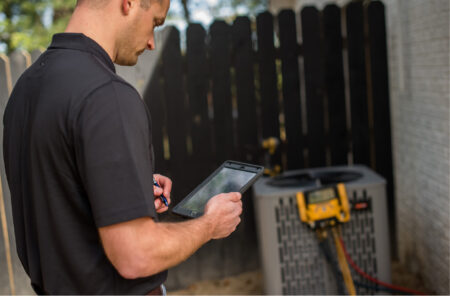
Many people think of allergy season as a singular period during the year. If you deal with bad allergies, you know this isn’t the case. There are year-round triggers, including dust, pet dander, mold and insects. There are also multiple seasons within the year depending on where you live. Tree pollen season in Missouri tends to run from February through June. Grass pollen season starts in May and can extend into September, and weed pollen season is August through November. Armed with this information, let’s explore the steps you can take to optimize your HVAC system.
Dust Control
Forced-air HVAC systems often get a bad rap when it comes to allergies, but dust is the real culprit here. If you have a dust problem, your HVAC system will exacerbate it. If you have dust in your home under control, your HVAC system will actually help you maintain good indoor air quality.
Dust is a year-round problem. It has a negative impact on everyone but particularly those with allergies and other respiratory ailments. The EPA encourages homeowners to dust once a week at a minimum. Dust rooms from the top to the bottom. Take extra care with potential dust traps. Finally, vacuum hardwood floors, rugs, carpets and furnishings. Consider a vacuum with a high-efficiency particulate air (HEPA) filter. It will help ensure that the vacuum traps most of the dust rather than just recirculate it.
Professional HVAC Maintenance
Another way to ensure that your HVAC system doesn’t negatively impact your indoor air quality is seasonal maintenance. The general advice is to schedule cooling maintenance in the spring and heating maintenance in the fall. There’s no perfect timing here as far as allergies go. Schedule before you need to run your heating and cooling units, and aim for consistent timing year to year.
There are many good reasons to schedule a seasonal tune-up. Cleanliness is the top reason when it comes to allergies. Your HVAC technician will clean all aspects of your HVAC system. This is particularly notable when it comes to your evaporator coil. A dirty coil can add many impurities to the air during summertime and even wintertime if you have a heat pump.
Dust also builds up in your ducts, which is why you should schedule a duct inspection annually. You can plan it alongside HVAC maintenance either in the fall or spring. Have your HVAC technician clean the ducts as needed. For those with allergies, this will often be every other year.
HVAC Filter
If you have a central system, check your HVAC filter once a month at least. Replace it when dust is visibly accumulating and the filter is starting to clog. Avoid waiting for the dust to cake up. If you have a ductless mini-split, wash the filter at least every other week, and replace the filter annually.
Another consideration when it comes to your HVAC filter is minimum efficiency reporting value (MERV). MERV is a scale from 1 to 20 that indicates how effective an air filter is. A higher number means that a product provides better filtration but also restricts airflow more. It’s important not to choose a filter that disrupts the static air pressure of your air handler. You should use a filter with as high of a MERV rating as your HVAC technician recommends.
Most HVAC systems support between MERV 8 and 13. MERV 13 is typical for modern HVAC systems and is all you need for allergens generally. There are filters, for instance, with electrostatic technology that can trap more particles. You may want to discuss this with your allergist.
Dehumidification
Relative humidity (RH) is also a factor because air with more moisture vapor can hold more particulate matter. You should never have humidity above 60%, and you should ideally target between 30% and 50%. If you can’t achieve your ideal RH in hotter weather through the AC alone, you may need a whole-house dehumidifier. You’ll be more comfortable and breathe easier. Maintaining an optimal RH will also make mold and dust mites in the home much less likely. They simply can’t survive at that RH.
Humidification
RH is a consideration in winter as well. The air is drier, which can inflame your respiratory system. That makes you more prone to allergic episodes and to heightened allergy symptoms. It can also make you more prone to respiratory infections. This sensitivity is particularly notable during ragweed season. Many people don’t realize that the dry air is a main reason why their ragweed allergies are so severe.
HVAC and Indoor Air Quality Services in Festus
If you live in Festus or a neighboring community and deal with allergies, Bone Heating & Cooling can help. We offer duct installation and cleaning and specialize in ventilation, air purification and humidity control. Our HVAC technicians install, maintain and repair air conditioners, heat pumps, gas and electric furnaces and ductless mini-splits. We install electric and gas fireplaces and tankless and tank water heaters. You can also count on us for all your sheet metal fabrication needs. Call Bone Heating & Cooling today to schedule an appointment or to ask any questions.
Contact Bone Heating & Cooling today!

